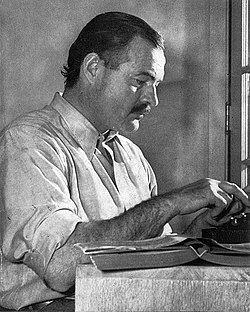Ernest Hemingway Quote
My wife and I had called on Miss Stein, and she and the friend who lived with her had been very cordial and friendly and we had loved the big studio with the great paintings. It was like one of the best rooms in the finest museum except there was a big fireplace and it was warm and comfortable and they gave you good things to eat and tea and natural distilled liqueurs made from purple plums, yellow plums or wild raspberries. These were fragrant, colorless alcohols served from cut-glass carafes in small glasses and whether they were quetsche, mirabelle or framboise they all tasted like the fruits they came from, converted into a controlled fire on your tongue that warmed you and loosened your tongue. Miss Stein was very big but not tall and was heavily built like a peasant woman. She had beautiful eyes and a strong German-Jewish face that also could have been Friulano and she reminded me of a northern Italian peasant woman with her clothes, her mobile face and her lovely, thick, alive immigrant hair which she wore put up in the same way she had probably worn it in college. She talked all the time and at first it was about people and places.
My wife and I had called on Miss Stein, and she and the friend who lived with her had been very cordial and friendly and we had loved the big studio with the great paintings. It was like one of the best rooms in the finest museum except there was a big fireplace and it was warm and comfortable and they gave you good things to eat and tea and natural distilled liqueurs made from purple plums, yellow plums or wild raspberries. These were fragrant, colorless alcohols served from cut-glass carafes in small glasses and whether they were quetsche, mirabelle or framboise they all tasted like the fruits they came from, converted into a controlled fire on your tongue that warmed you and loosened your tongue. Miss Stein was very big but not tall and was heavily built like a peasant woman. She had beautiful eyes and a strong German-Jewish face that also could have been Friulano and she reminded me of a northern Italian peasant woman with her clothes, her mobile face and her lovely, thick, alive immigrant hair which she wore put up in the same way she had probably worn it in college. She talked all the time and at first it was about people and places.
Related Quotes
About Ernest Hemingway
Hemingway was raised in Oak Park, Illinois, a suburb of Chicago. After high school, he spent six months as a reporter for The Kansas City Star before enlisting in the Red Cross. He served as an ambulance driver on the Italian Front in World War I and was seriously wounded by shrapnel in 1918. In 1921, Hemingway moved to Paris, where he worked as a foreign correspondent for the Toronto Star and was influenced by the modernist writers and artists of the "Lost Generation" expatriate community. His debut novel, The Sun Also Rises, was published in 1926. In 1928, Hemingway returned to the U.S., where he settled in Key West, Florida. His experiences during the war supplied material for his 1929 novel A Farewell to Arms.
In 1937, Hemingway went to Spain to cover the Spanish Civil War, which formed the basis for his 1940 novel For Whom the Bell Tolls, written in Havana, Cuba. During World War II, Hemingway was present with Allied troops as a journalist at the Normandy landings and the liberation of Paris. In 1952, his novel The Old Man and the Sea was published to considerable acclaim, and won the Pulitzer Prize for Fiction. On a 1954 trip to Africa, Hemingway was seriously injured in two successive plane crashes, leaving him in pain and ill health for much of the rest of his life. He committed suicide at his house in Ketchum, Idaho, in 1961.
